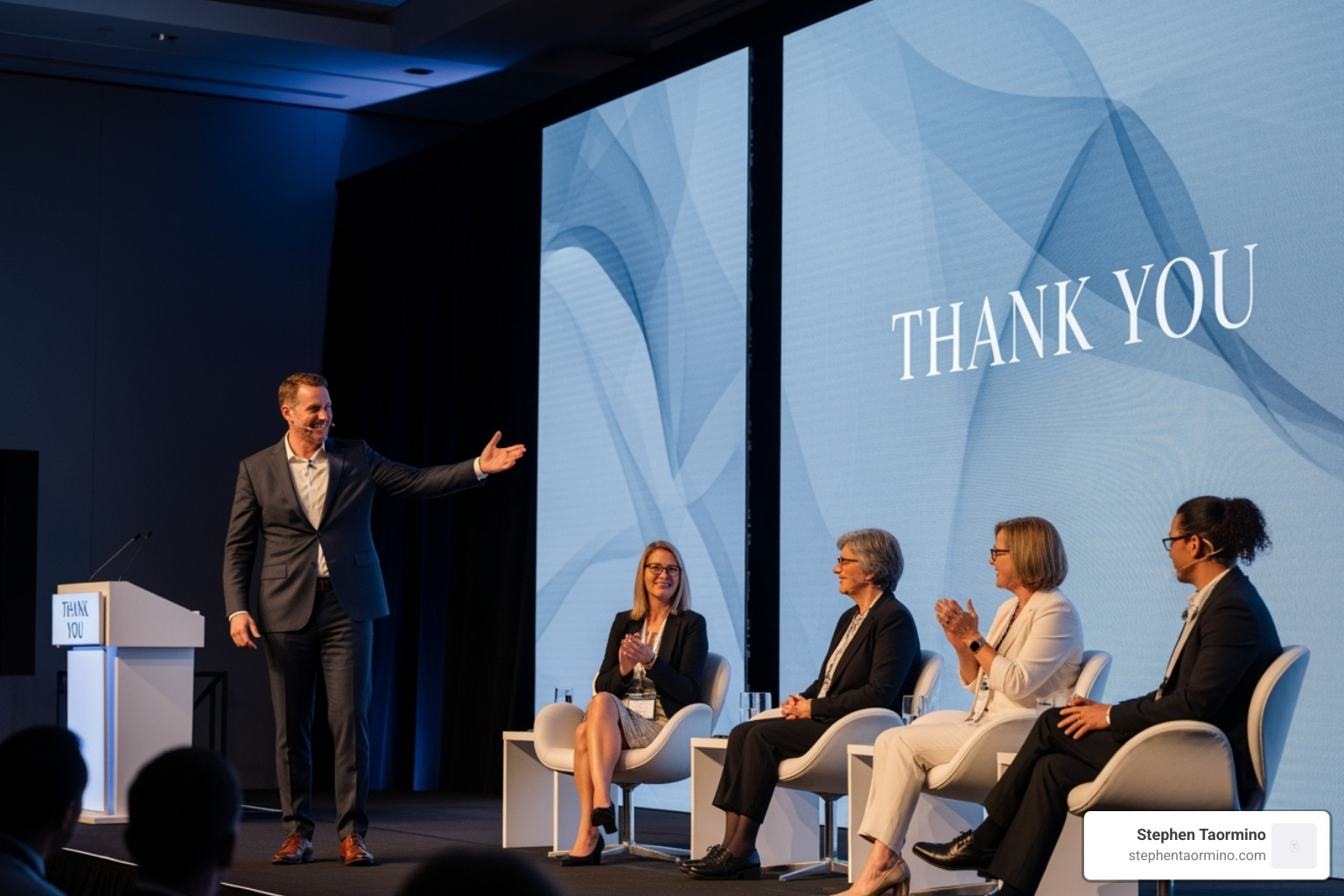No. 1 How to be a good moderator in a panel discussion
Why Great Panel Moderation Separates Leaders from the Pack
How to be a good moderator in a panel discussion starts with understanding one fundamental truth: the moderator makes or breaks the entire experience. Whether you’re facilitating industry experts at a conference or leading internal discussions, your role determines if the audience walks away enlightened or checks their phone halfway through.
Here’s a quick-start guide to effective panel moderation:
- Serve the audience first – Your job is to extract value for them, not satisfy panelist egos.
- Prepare thoroughly – Research panelists, craft open-ended questions, and know your topic.
- Control the flow – Manage time, balance speaking opportunities, and keep discussions on track.
- Stay neutral – Guide without dominating or becoming a panelist yourself.
- Handle disruptions – Use polite cutoff phrases and redirect dominant speakers gracefully.
As one industry veteran puts it: “The panel discussion was invented by someone who liked to sit three feet above his audience, talk with five of his closest friends for an hour, and barely acknowledge that there are 100 other people in the room.” Don’t let that be your panel.
The difference between a forgettable discussion and one that sparks meaningful conversation lies in preparation, audience focus, and skillful facilitation. When done right, panel moderation showcases your leadership abilities while delivering genuine value.
I’m Steve Taormino, and in my 25+ years leading strategic communications, I’ve found that mastering how to be a good moderator in a panel discussion directly translates to stronger leadership. The skills that make panels engaging—active listening, strategic questioning, and managing diverse personalities—are the same ones that drive organizational prosperity.
How to be a good moderator in a panel discussion vocabulary:
The Moderator’s Mindset: Your Role is to Serve the Audience
The truth that separates great moderators from forgettable ones is this: the moment you step onto that stage, it’s not about you. It’s about the people who carved time out of their schedules to learn something valuable.
Too many moderators treat panels like their personal talk show, asking questions that satisfy their own curiosity. How to be a good moderator in a panel discussion starts with embracing a simple principle: you are the audience’s advocate. Your job is to extract maximum value, even if it means politely cutting off a panelist or steering the conversation away from self-promotion.
Think of yourself as a benevolent dictator with one mission: ensuring everyone walks away with something meaningful. This mindset shift changes everything. Active listening becomes your superpower, helping you spot the golden moments worth exploring and the dead ends worth abandoning.
Understanding Your True Objective
Your goal isn’t to make panelists happy or showcase your own expertise. Your goal is creating value for the audience, period. This means sometimes asking an uncomfortable follow-up question or interrupting a polished but irrelevant answer. You’re not there to be the star—you’re the facilitator who makes the real stars shine. When panelists veer into company pitches or jargon, your job is to guide them back to insights that matter. You’re orchestrating a conversation that yields new perspectives, not just a series of individual presentations.
Cultivating the Right Energy and Presence
Your energy sets the tone. Aim for engaged confidence—excited to be there, but not performing. Match the room’s energy while gently elevating it. A breakfast session calls for warm professionalism, while an evening panel might need more dynamic energy.
Neutrality is key. Avoid reactions like “That’s brilliant!” which can diminish other panelists. Instead, use neutral acknowledgments like “Thank you for that perspective.”
Your body language speaks volumes. Stand tall, make eye contact with both panelists and the audience, and use open gestures. Even small cues—like a deliberate breath—can signal your intent to guide the discussion. The most effective moderators project quiet authority, making it clear they are in control of the flow without being heavy-handed.
Before the Curtain Rises: The Blueprint for Flawless Preparation
Great panel discussions don’t just happen—they’re carefully orchestrated. How to be a good moderator in a panel discussion depends heavily on what you do before anyone takes the stage. This preparation is your foundation for an engaging, insightful session.

Research: Know Your Topic and Your Talent
Your research has two parts: the topic and the panelists.
- Master the topic. Dive into recent articles, industry trends, and emerging viewpoints. Understand how the topic affects your audience, what challenges they face, and what solutions your panelists might offer.
- Know your panelists as people. Review their backgrounds, looking for unique experiences, published works, and areas where they might disagree—these differences often create the most engaging discussions.
Most importantly, talk to your panelists before the event. A brief call helps you understand their communication styles, find their passion projects, and learn the correct pronunciation of their names. Ask about recent challenges they’ve faced; these details become the foundation for personalized questions that go beyond generic talking points.
Crafting Questions That Spark Conversation, Not Monologues
Your questions steer the discussion. The goal is to encourage revelation, not simple yes-or-no responses.
- Prepare about ten thoughtful, open-ended questions that begin with “why,” “how,” or “what happens when.” Instead of “Is digital change important?” try “What’s the biggest mistake you see companies making during digital change?”
- Personalize your questions. Reference a panelist’s actual work or experience to get authentic, engaging responses.
- Keep questions short and simple, allowing you to adapt on the fly.
- Consider using behavioral economics to frame questions like “Tell us about a time when…” to yield compelling stories.
- Start with a broad, accessible “softball” question to help everyone settle in.
The Pre-Panel Huddle: Aligning for Success
The pre-panel huddle is your secret weapon for alignment. This can be a conference call or a brief in-person meeting.
- Provide a briefing pack with the agenda, themes, audience demographics, and time expectations. When panelists know the boundaries, they’re more understanding if you need to redirect them.
- Establish rapport between panelists. A comfortable group has a more natural conversation.
- Walk through the general flow, but emphasize it’s not a rigid script. Encourage key points, not rehearsed answers.
- Set clear expectations about your role. Explain that you’ll be actively managing time to serve the audience. Most panelists appreciate this.
This preparation is what separates memorable panels from forgettable ones. When you’ve done your homework, you’re ready to facilitate a conversation that truly serves your audience.
Showtime: How to Be a Good Moderator in a Panel Discussion
The moment of truth arrives. All your preparation culminates in this live event, where your skills in real-time management and facilitation truly shine. Your ability to keep the discussion moving, ensure everyone is heard, and manage unexpected turns will define your success.
Kicking Things Off: Introductions and Setting the Stage
The opening moments are critical for setting the tone.
- Hook the Audience: Start with a warm greeting and a compelling hook—a short quote, analogy, or anecdote related to the topic. Clearly state the panel’s goals.
- Concise Introductions: Introduce the panelists yourself. This saves time and allows you to highlight why their insights are relevant. Focus on one to three key details and avoid reading a long bio. A personal tidbit can humanize them and set a relatable tone.
Managing the Flow: How to be a good moderator in a panel discussion by balancing voices
Your core responsibility is to ensure a balanced and dynamic conversation.
- Ensure Equal Airtime: It’s your job to ensure every panelist contributes. Direct questions to quieter panelists or invite their opinion with a simple, “Jen, any thoughts on that?”
- Handle Dominant Panelists: This is where your “benevolent dictator” role is key. Politely but firmly intervene with “cutoff phrases” like, “Thank you, that’s an interesting point, but I’d like to hear [Other Name]’s perspective.” The goal is to reel them in gently.
- Encourage Interaction: Foster a conversational atmosphere. Prompt panelists to comment on each other’s points by asking, “Do we all agree with what Joe just said?” This creates a more dynamic discussion.
- Stay on Topic: Keep the conversation focused, but allow for brief, engaging tangents. If it strays too far, a simple, “Let’s bring it back to…” is usually sufficient.
- Listen Actively: Listen not just to words but to emotions and body language. This allows you to ask more insightful follow-up questions and weave the conversation together.
Engaging the Crowd: Involving the Audience for a Dynamic Session
A great panel makes the audience feel like active participants.
- Integrate Audience Questions: Mix in audience questions throughout the debate, not just at the end. Using a digital Q&A platform to crowdsource questions in real-time is highly effective.
- Warm-Up Polls: A quick poll at the beginning can engage the audience immediately and provide a natural bridge to the main topic.
- Manage Q&A Time: Allocate dedicated time for audience questions and stick to it. Have backup questions ready in case the audience is quiet.
- Repeat for Clarity: Always repeat audience questions into the microphone so everyone can hear. If a question is long-winded, politely summarize it.
- Handle “Comments” Gracefully: If an audience member offers a comment instead of a question, politely ask them to be brief. If they try to start a debate, interrupt and redirect to protect the panel’s flow.
Sticking the Landing: Concluding with Impact and Avoiding Common Pitfalls
The final moments can transform a good discussion into an unforgettable one. A strong conclusion doesn’t just wrap things up; it sends your audience away with clear takeaways and a sense that their time was well spent. Unfortunately, this is where many moderators stumble, but these pitfalls are avoidable.

How to Conclude a Panel Discussion to Leave a Lasting Impression
As you approach the final 10 minutes, shift gears to create a memorable finish.
- Start with a final lightning round. About five minutes before the end, ask each panelist for one key takeaway or 30 seconds of advice. This encourages brevity and delivers impactful, quotable closing remarks.
- Summarize the key themes. Briefly highlight the two or three most salient insights that emerged. This solidifies the learning and shows you were actively engaged.
- Express genuine gratitude. Thank your panelists for their expertise and your audience for their attention and engagement.
- End with a clear call to action. If appropriate, share a hashtag, information on how to connect with panelists, or details about related events to extend the life of the discussion.
A powerful ending is as important as a powerful opening. Your final words should leave people feeling energized and equipped.
Common Pitfalls and How to Avoid Them
Even experienced moderators can fall into these traps. Learning how to be a good moderator in a panel discussion means recognizing these potential problems before they happen.
- Losing control of time: Running over schedule is unprofessional. Manage time vigilantly throughout, stick to your agenda, and don’t be afraid to politely move things along.
- Asking leading questions: Questions like “Don’t you think that…” reveal your bias and undermine your neutrality. Facilitate open discussion, don’t guide it to a predetermined conclusion.
- Becoming a panelist yourself: It’s tempting to share your own insights, but this abandons your role as facilitator. If you must add context, keep it brief and quickly return to your neutral position.
- Letting panelists pitch: Audiences attend to learn, not to hear a sales pitch. Set clear expectations beforehand and be prepared to redirect anyone who veers into promotional territory.
- Awkward silence: This can happen when audience questions dry up. Always have backup questions ready. Ending a few minutes early is far better than letting uncomfortable silence stretch on.
Your audience doesn’t expect perfection, but they do expect a moderator who can handle unexpected moments with grace while keeping the discussion valuable.
Frequently Asked Questions about Panel Moderation
After years of working with moderators, I hear the same thoughtful questions repeatedly. Addressing them will make you a more confident facilitator.
How many panelists should you have for a discussion?
The sweet spot for how to be a good moderator in a panel discussion is 3 to 5 panelists. This range creates the right dynamic for meaningful conversation. Too many voices become unwieldy, while too few struggle to generate diverse perspectives. Four experts with different backgrounds often create a robust dialogue without descending into chaos, as each person gets adequate speaking time.
What’s the best way to handle a panelist who goes off-topic?
This tests your diplomatic skills. Give the panelist a moment; sometimes a tangent circles back with an unexpected insight. However, if it’s clear they’re not returning to the topic, step in gracefully. A simple, warm interjection like, “That’s an interesting point, but for the sake of time, let’s refocus on [main topic]” works wonders. Your job is to protect the audience’s time while keeping everyone feeling respected.
How do you prepare for moderating a panel on a topic you don’t know well?
This is common and can be an advantage. Your role is to facilitate, not to be the smartest person on stage.
- Start with intensive research. Dive into articles and reports to understand the fundamentals and language of the field.
- Leverage your outsider perspective. Your fresh eyes can lead you to ask foundational questions that insiders might overlook but that the audience needs answered.
- Craft foundational questions. Start with broader queries like, “Help our audience understand why this matters right now,” to establish context.
- Focus on audience benefit. Even without deep expertise, you can guide the discussion toward what the audience hopes to gain, ensuring the conversation provides real value.
Some of the best-moderated panels are led by people who aren’t subject matter experts but are exceptional at drawing out insights and making complex topics accessible.
Conclusion: Become the Moderator Everyone Remembers
Mastering how to be a good moderator in a panel discussion transforms you from a timekeeper into a leader who creates unforgettable experiences. The skills we’ve covered—serving the audience, preparing carefully, managing conversations with grace, and closing with impact—are leadership principles that extend far beyond the stage.
When you step into the moderator’s role, you’re demonstrating the kind of leadership that inspires confidence and builds connections. The active listening, strategic questioning, and ability to balance diverse personalities that make a panel great are the same skills that will make you a more effective manager and strengthen every team you lead.
The moderators you remember are the ones who made you feel heard, drew out new insights, and left you with actionable ideas. That’s the kind of continuous improvement mindset that separates good leaders from great ones.
Throughout my 25+ years leading strategic communications, I’ve seen how effective moderation mirrors impactful leadership. Success comes from understanding human behavior, fostering genuine connections, and creating environments where the best ideas can flourish.
Becoming the moderator everyone remembers isn’t about perfection—it’s about authenticity, preparation, and a genuine commitment to serving others. When you focus on creating value for your audience, something magical happens: conversations flow, ideas spark, and everyone leaves feeling their time was well spent.
Ready to lift your next event? Explore our videos or contact us to book a speaking engagement or workshop that brings these principles to life.
